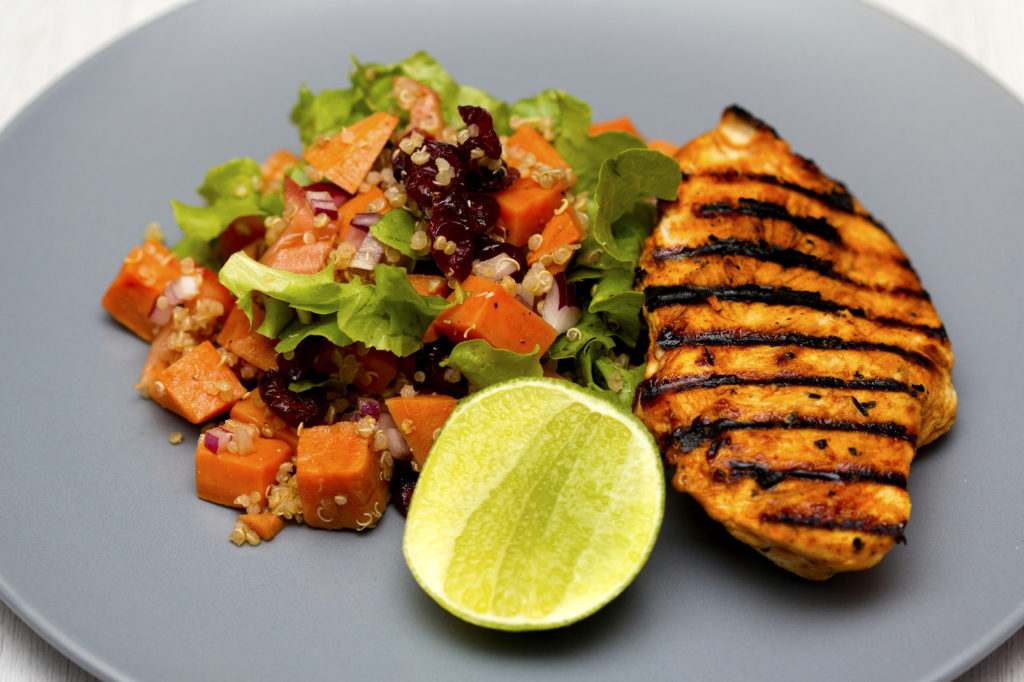I recently joined forces with Dr.Paul Nussbaum at the Brain Health Center, Inc. to help promote the importance of brain health. Dr. Nussbaum’s 5 main pillars of brain health and wellness are: Socialization, Physical Activity, Mental Stimulation, Spirituality and Nutrition. Most people don’t think too much about the importance of nutrition for brain health. Eating more whole foods and less processed foods is important for over all health. What do you think blueberries, salmon and coconut all have in common?? The answer is… ALL are BRAIN Foods! That’s right, eating these foods can actually protect your brain. We often understand that our diet can impact nearly every chronic condition, but what we may not realize, is that it can impact our brain health as well. Eating more foods that contain high levels of phytonutrients, antioxidants and omega 3 fats, can increase your cognitive health and decrease inflammation. So how can you can protect your brain through your diet and lifestyle?
1. Eat breakfast daily. Start each day with a balanced breakfast. People who eat breakfast weigh less—important since obesity is a risk factor for Alzheimer’s disease. Missing out on breakfast means missing out on the opportunity to maximize nutrition for the entire day! Think smoothies, eggs or egg whites, oatmeal with fruit and nuts, and other foods that provide a variety of nutrients.
2. Increase intake of omega-3 fats and DHA. A growing body of evidence links the benefits of DHA, a fatty acid found in cold water fish, and brain health. Boost DHA intake by eating salmon, sardines, tuna and mackerel. Vegetarian sources of these nutrients are blue algae or seaweed, also known as spirulina.
3. Reach for the coconut. Coconut oil contains high levels of medium-chain triglycerides (MCT), which have been shown to improve glucose metabolism in the brain. It also is ideal for cooking because it is stable at high temperatures. . And, coconut water is great for hydration, after a workout or anytime.
4. Taste the rainbow. Choose colorful, nutrient-rich fruits and vegetables, which contain high levels of antioxidants and phytonutrients that can help decrease inflammation as well as oxidative damage associated with neurodegeneration – or the breakdown of nerve tissue.
5. Bulk up on berries. In addition to eating a colorful diet, focus on including more berries. The protective effect of berries against inflammation is well-documented. Research shows that high intakes of blueberries and strawberries can improve behavior and cognitive function1.
6. Pack a punch with probiotics. Hippocrates once said, “All diseases start in the gut.” What a genius! More and more research is showing the connection between stomach/intestinal health and whole body health. In a recent study, scientists found that a probiotic regimen for 30 days in humans reduced symptoms of anxiety, depression and anger2. Probiotics are “good bacteria” that help with digestive health. Probiotic-rich foods include yogurt, kefir, sauerkraut, kombucha and kimchi.
7. Chart a course for the Mediterranean. Studies have shown that a Mediterranean diet – long touted for its perceived heart health benefits – also may benefit brain health, as well. This eating plan emphasizes consumption of monunsaturated fats, such as olive oil, as well as vegetables, fruit, whole grains, legumes (beans), nuts, and fish.
8. Enjoy that cup of coffee. Studies4 link moderate caffeine consumption to possible decrease in neurodegeneration associated with Alzheimer’s disease.
9. Be a “B”-liever. People with mild cognitive impairment who took a high-dose regimen of B12, B6 and folic acid experienced significantly reduced atrophy in the areas of the brain most seriously affected by Alzheimer’s disease. In addition, volunteers who took the B vitamins performed better on cognitive tests.
10. Say “Cheers!” To protect brain health, alcohol should be consumed in moderation, but there is good news for those who like to imbibe occasionally. Researchers in the UK have uncorked an interesting bit of information: a compound found in Pinot noir and Pinot meunier grapes – both of which are used for champagne – can help hold forgetfulness at bay.
Berry Breakfast Smoothie
1 cup frozen or fresh mixed berries
6-oz 0% fat Greek yogurt
1cup coconut water
2 tsp spirulina powder or ground flaxseed
1 banana
½ cup kale or spinach
Add ingredients to a blender and blend!
Serves 2.
Calories 160 Fat 1g Sodium 190mg Carbohydrate 30g Sugar 18g Dietary Fiber 5g Protein 11g
For more information on the Brain Health Center, Inc by Dr. Paul Nussbaum, visit www.brainhealthctr.com



